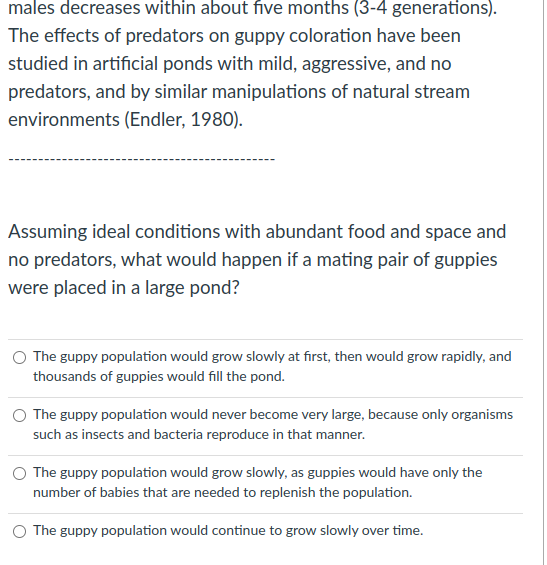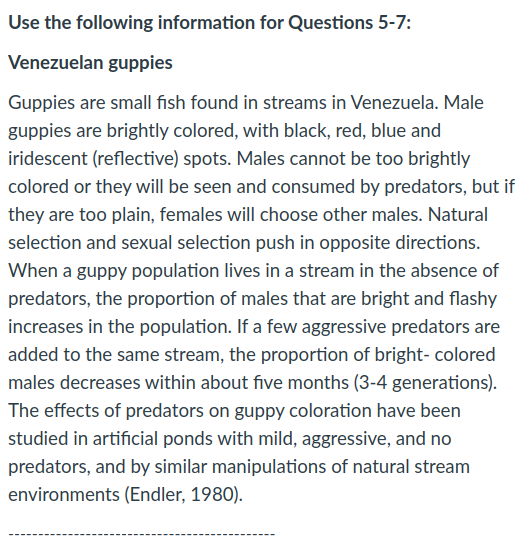Assuming ideal conditions with abundant food and space and no predators, what would happen if a mating pair of guppies were placed in a large pond? O The guppy population would grow slowly at first, then would grow rapidly, and thousands of guppies would fill the pond. O The guppy population would never become very large, because only organisms such as insects and bacteria reproduce in that manner. O The guppy population would grow slowly, as guppies would have only the number of babies that are needed to replenish the population. O The guppy population would continue to grow slowly over time.
Assuming ideal conditions with abundant food and space and no predators, what would happen if a mating pair of guppies were placed in a large pond? O The guppy population would grow slowly at first, then would grow rapidly, and thousands of guppies would fill the pond. O The guppy population would never become very large, because only organisms such as insects and bacteria reproduce in that manner. O The guppy population would grow slowly, as guppies would have only the number of babies that are needed to replenish the population. O The guppy population would continue to grow slowly over time.
Human Biology (MindTap Course List)
11th Edition
ISBN:9781305112100
Author:Cecie Starr, Beverly McMillan
Publisher:Cecie Starr, Beverly McMillan
Chapter23: Principles Of Evolution
Section: Chapter Questions
Problem 3SQ: A difference in survival and reproduction among members of a population that vary in one or more...
Related questions
Question
Using information given answer the following question.

Transcribed Image Text:males decreases within about five months (3-4 generations).
The effects of predators on guppy coloration have been
studied in artificial ponds with mild, aggressive, and no
predators, and by similar manipulations of natural stream
environments (Endler, 1980).
Assuming ideal conditions with abundant food and space and
no predators, what would happen if a mating pair of guppies
were placed in a large pond?
The guppy population would grow slowly at first, then would grow rapidly, and
thousands of guppies would fill the pond.
The guppy population would never become very large, because only organisms
such as insects and bacteria reproduce in that manner.
O The guppy population would grow slowly, as guppies would have only the
number of babies that are needed to replenish the population.
O The guppy population would continue to grow slowly over time.

Transcribed Image Text:Use the following information for Questions 5-7:
Venezuelan guppies
Guppies are small fish found in streams in Venezuela. Male
guppies are brightly colored, with black, red, blue and
iridescent (reflective) spots. Males cannot be too brightly
colored or they will be seen and consumed by predators, but if
they are too plain, females will choose other males. Natural
selection and sexual selection push in opposite directions.
When a guppy population lives in a stream in the absence of
predators, the proportion of males that are bright and flashy
increases in the population. If a few aggressive predators are
added to the same stream, the proportion of bright- colored
males decreases within about five months (3-4 generations).
The effects of predators on guppy coloration have been
studied in artificial ponds with mild, aggressive, and no
predators, and by similar manipulations of natural stream
environments (Endler, 1980).
Expert Solution
This question has been solved!
Explore an expertly crafted, step-by-step solution for a thorough understanding of key concepts.
This is a popular solution!
Trending now
This is a popular solution!
Step by step
Solved in 2 steps

Knowledge Booster
Learn more about
Need a deep-dive on the concept behind this application? Look no further. Learn more about this topic, biology and related others by exploring similar questions and additional content below.Recommended textbooks for you

Human Biology (MindTap Course List)
Biology
ISBN:
9781305112100
Author:
Cecie Starr, Beverly McMillan
Publisher:
Cengage Learning

Human Biology (MindTap Course List)
Biology
ISBN:
9781305112100
Author:
Cecie Starr, Beverly McMillan
Publisher:
Cengage Learning